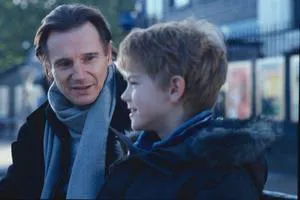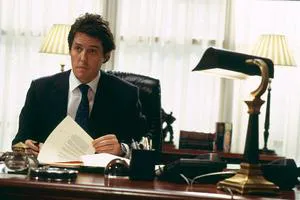
“Love Actually” bears as much resemblance to reality as Santa Claus does. Only the most resolute individuals can bring themselves to go to bed on Christmas Eve without decorating a tree, preparing a mountain of “Olivier” salad, or indulging in a sip of champagne. Similarly, a colleague who saw this British Christmas fairytale was right when he said, “It’s just like ‘An Orphan of Kazan’!” Richard Curtis’s London is as much like Santa Claus compared to Kazan.
Richard Curtis, once solely a screenwriter, crafted an entire society that sequentially experienced four weddings and one funeral over several years. Now, as both screenwriter and director, he has again depicted a society, but this time, the weddings and funerals occur simultaneously within a month. This is arguably closer to reality and far more dynamic, although such a whirlwind of emotions and relationships as seen in “Love Actually” is perhaps only plausible during the Christmas season. At any other time, the story would seem foolish and contrived. However, due to the breadth of the society depicted, the fairytale-like speed of individual relationships is less noticeable, and by touching upon all forms of love, the film itself resembles the pleasant hustle and bustle of the pre-Christmas season. You want to remember that gift, and this one, and this person, and that one too.
A Christmas Gift Recommendation

I won’t retell the plot as a matter of principle – consider it my gift suggestion to buy tickets or the DVD and insert it into your player right before midnight instead of another Kazan TV nightmare. Moreover, while touching upon all forms of love except the perverse, the plot merely uses love as material – for jokes, shows, parades, and other cinematic pleasures. The actual story is the gradual revelation of the personal connections between all the characters, initially disparate as if in a chronicle. Who is related to whom, in the end, is a very amusing tale. When this is placed within an elegant vignette (a chronicle-like opening at the airport, then “six weeks until Christmas,” “five weeks until Christmas,” “four-three-two-one,” “Christmas,” and “a month later” at the same airport, but now artistically), such a musical and therefore convincing move makes one feel the joy of life, like a song. Not a feeling of deep satiety, not contentment, not “stop, moment,” but, on the contrary, ceaselessness as a fullness of feelings. “Everything was in the past, everything will be repeated again, but the moment of recognition is sweet to us.”
The Magic of British Acting

Although some final “recognitions” are far-fetched, and some things remain off-screen, and Laura Linney, who most deserved joy, is left without a drop of it in the end; although the increase in playfulness does not justify, but rather exposes the initially high degree of pathos, everything as a whole, besides the vignette, is justified by the best English acting school in the world. Try to cry so naturally and unashamedly as Liam Neeson, portray such a jaundiced mind as Alan Rickman (and where would you find one?), be as stunningly beautiful as Keira Knightley (“Pirates of the Caribbean”), or be a hundred percent believable as a brazen and ginger aging rock idol, like the unknown theatrical actor Bill Nighy. It occurred to me that we simply don’t know English rock well if we don’t know his Billy Mack. Colin Firth subtly ironizes his inevitable pre-Hollywood sequel to “Bridget Jones’s Diary,” and what the two extras from the porn series (Martin Freeman and Joanna Page) do is beyond words.

In short, you are in for psychologically accurate observations (how you can run down the street and cover your face with your hands, and bump into passers-by when someone indifferent to you finds out everything), witty dialogues (“No, my friends, this is not the first place at all”), simply funny situations (an Englishman and a Portuguese woman in the French province said everything to each other when they fell into an overgrown pond, but neither knew the other’s language). And if not by Christmas, if not by the acting school, then all this will be justified by the obvious fact why nothing like this can happen in Kazan. Please take into account the main gift of “Love Actually” – of course, how Hugh Grant dances.
The Anti-Kazan Essence

Not only do you generally believe in his Prime Minister (why not, when Tony Blair had his fourth child), but he also dances very well at forty-three. A separate concert number from a far from ballet star is the anti-Kazan essence. Throughout the film, all the English, up to the school teachers during the matinee and the managers at the corporate party, move freely. Their legs are not wooden, their hips are not clumsy, their shoulders are not pinched, their necks do not petrify – there is nothing in them from our “discos,” eternally slipping into “two stomps-three claps.” From all this, it is clear that they have no complexes, they know their worth, even if they work in service.
They, if they want Santa Claus to exist, will get their way. They won’t take what they give in our anecdote: “What Hollywood, I have a Christmas tree.”